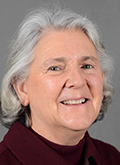2023 Penn Veterinary Medicine Teaching Awards
The Zoetis Distinguished Veterinary Teacher Award
 This year’s Zoetis Distinguished Veterinary Teacher Award was presented to Koranda Walsh. The Zoetis Distinguished Veterinary Teacher Award is the most prestigious teaching award in veterinary medicine. It is presented annually to a faculty member at every college of veterinary medicine in the United States by Zoetis Animal Health. Its purpose is “to improve veterinary medicine education by recognizing outstanding instructors who, through their ability, dedication, character and leadership, contribute significantly to the advancement of the profession.” The entire Penn Vet student body votes on the recipient.
This year’s Zoetis Distinguished Veterinary Teacher Award was presented to Koranda Walsh. The Zoetis Distinguished Veterinary Teacher Award is the most prestigious teaching award in veterinary medicine. It is presented annually to a faculty member at every college of veterinary medicine in the United States by Zoetis Animal Health. Its purpose is “to improve veterinary medicine education by recognizing outstanding instructors who, through their ability, dedication, character and leadership, contribute significantly to the advancement of the profession.” The entire Penn Vet student body votes on the recipient.
Dr. Walsh graduated magna cum laude from Duke University and earned a BS with distinction in biology. She then graduated summa cum laude from Penn Vet. Her small animal rotating internship at the University of Minnesota was followed by a small animal internal medicine residency and then a clinical pathology residency, both at Penn Vet. After becoming double boarded in her specialties, she worked for several years in a diagnostic lab before joining the Penn Vet faculty. She is currently an assistant professor of clinical pathology in the department of pathobiology. Her interests include diagnostic cytopathology and hematopathology (with a special interest in hematopoietic diseases) as well as the implementation of innovative teaching methods.
One student remarked, “Every day in her class, I feel like a detective, trying to figure out cases. Sometimes it can be frustrating, but somehow, by the end of the day, she helps you understand in a way that is never condescending or makes you feel bad for not knowing. Her passion for veterinary medicine, especially clinical pathology, and for teaching shines through.”
The William B. Boucher Award for Outstanding Teaching, the Class of 2023 Lecture Teaching Award, and the Class of 2023 NBC Instructor Award
 The Boucher Award for Outstanding Teaching honors a house officer at New Bolton Center for excellent teaching, as was exemplified by William Boucher over four decades at Penn Vet. The graduating class votes on the recipient. The selection criteria include teaching skills, knowledge in the candidate’s area of expertise, responsiveness to the needs of students, willingness to participate in off-hour seminars and discussions, and dedication to New Bolton Center and to the veterinary profession.
The Boucher Award for Outstanding Teaching honors a house officer at New Bolton Center for excellent teaching, as was exemplified by William Boucher over four decades at Penn Vet. The graduating class votes on the recipient. The selection criteria include teaching skills, knowledge in the candidate’s area of expertise, responsiveness to the needs of students, willingness to participate in off-hour seminars and discussions, and dedication to New Bolton Center and to the veterinary profession.
The winner of the Boucher Award and the two Class of 2023 awards is Sarah Colmer, a fellow in large animal neurology, who exhibits excellence in these areas and more. Students comment that Dr. Colmer presents an amazing combination of expertise in her field, teaching skills, and kindness and understanding. After graduating from Penn Vet in 2017 and completing internships at the Mid-Atlantic Equine Medical Center in New Jersey and at New Bolton Center, she completed a residency in large animal internal medicine at New Bolton Center in 2022. She has particular interest in equine neurodegenerative disease and a passion for teaching.
One student remarked, “Dr. Colmer is very approachable as a clinician. She is willing to take the time to go over the material with students and wants them to continuously do their best and learn. She is such a kind and supportive person!”
Another student said, “Dr. Colmer is excellent at teaching and able to make challenging neuro topics more understandable and less intimidating. She is always a pleasure to work with and seems to truly care about student education.”
Class of 2023 Ryan Instructor Award
 The winner of this award is Kathryn McGonigle, an assistant professor of clinical small animal internal medicine at the Penn Vet’s Ryan Hospital. She completed her DVM at Tufts University School of Veterinary Medicine in 2002, participated in field work with sea turtles in Long Island post-graduation, then practiced as a small animal and exotics general practitioner in New Jersey for four years. She completed an internship at Garden State Veterinary Specialists in 2008 and a residency at the Cornell University Hospital for Animals in 2011. She worked at BluePearl Veterinary Partners, a private practice in Brooklyn, until 2015, when she returned to academia. After a year as a clinical instructor at Cornell in 2016, she began her appointment at Penn Vet. Her special research interests include feline medicine, geriatric care, and infectious diseases.
The winner of this award is Kathryn McGonigle, an assistant professor of clinical small animal internal medicine at the Penn Vet’s Ryan Hospital. She completed her DVM at Tufts University School of Veterinary Medicine in 2002, participated in field work with sea turtles in Long Island post-graduation, then practiced as a small animal and exotics general practitioner in New Jersey for four years. She completed an internship at Garden State Veterinary Specialists in 2008 and a residency at the Cornell University Hospital for Animals in 2011. She worked at BluePearl Veterinary Partners, a private practice in Brooklyn, until 2015, when she returned to academia. After a year as a clinical instructor at Cornell in 2016, she began her appointment at Penn Vet. Her special research interests include feline medicine, geriatric care, and infectious diseases.
One student remarked, “Dr. McGonigle is great to work with. She is very approachable and wants students to do their best. She never makes you feel bad for not knowing something, and instead encourages you to work out whatever problem you are struggling with.”
Class of 2023 Laboratory Teaching Award
 The winner of this award, Heather Rudolph, is a certified veterinary technician who received her training from Harcum College. As the teaching lab coordinator, Ms. Rudolph has developed and manages the Clinical Skills Lab for students at Penn Vet. Through the lab, students have access to models to practice such skills as restraint, venipuncture, gowning and gloving, clinical pathology, and suturing. Before coming to Penn Vet, Ms. Rudolph worked in emergency and critical care at Crown Veterinary Specialists and Quakertown Veterinary Clinic.
The winner of this award, Heather Rudolph, is a certified veterinary technician who received her training from Harcum College. As the teaching lab coordinator, Ms. Rudolph has developed and manages the Clinical Skills Lab for students at Penn Vet. Through the lab, students have access to models to practice such skills as restraint, venipuncture, gowning and gloving, clinical pathology, and suturing. Before coming to Penn Vet, Ms. Rudolph worked in emergency and critical care at Crown Veterinary Specialists and Quakertown Veterinary Clinic.
One student remarked, “Heather Rudolph is an amazing woman. She is so responsive and helpful. I remember when she took the time to go over gowning and gloving with me again before the second year practical when I was super nervous for it. She does so much for the students and deserves so much credit for the Herculean effort that takes.”
Class of 2024 Lecture Teaching Award
 The winner of this award is Patricia L. Sertich, an associate professor-clinician educator in reproduction and behavior at Penn Vet. Based at the Georgia and Philip Hofmann Research Center for Animal Reproduction at New Bolton Center since 1983, Dr. Sertich evaluates large animals for breeding soundness and develops treatment plans to optimize their fertility. Dr. Sertich consults on reproductive issues of patients in the George Widener Hospital for Large Animals and is a critical member of its high-risk pregnancy management team. As a diplomate of the American College of Theriogenologists (ACT), she currently serves as its secretary and is on the ACT Examination Committee which determines board certification for veterinarians specializing in animal reproduction. Dr. Sertich has mentored many ACT diplomates and received numerous teaching awards, including three Carl J. Norden Distinguished Teaching Awards and the Christian R. and Mary F. Lindback Foundation Award (Almanac April 17, 2001). As the faculty liaison for the student chapter of the Society for Theriogenology, she trains students to develop excellent clinical skills, provides opportunities to gain clinical experience, and connects them with practices that will direct them to a satisfying and productive career in veterinary medicine.
The winner of this award is Patricia L. Sertich, an associate professor-clinician educator in reproduction and behavior at Penn Vet. Based at the Georgia and Philip Hofmann Research Center for Animal Reproduction at New Bolton Center since 1983, Dr. Sertich evaluates large animals for breeding soundness and develops treatment plans to optimize their fertility. Dr. Sertich consults on reproductive issues of patients in the George Widener Hospital for Large Animals and is a critical member of its high-risk pregnancy management team. As a diplomate of the American College of Theriogenologists (ACT), she currently serves as its secretary and is on the ACT Examination Committee which determines board certification for veterinarians specializing in animal reproduction. Dr. Sertich has mentored many ACT diplomates and received numerous teaching awards, including three Carl J. Norden Distinguished Teaching Awards and the Christian R. and Mary F. Lindback Foundation Award (Almanac April 17, 2001). As the faculty liaison for the student chapter of the Society for Theriogenology, she trains students to develop excellent clinical skills, provides opportunities to gain clinical experience, and connects them with practices that will direct them to a satisfying and productive career in veterinary medicine.
One student remarked, “Dr. Sertich cares deeply about getting to know her students as more than just a name, but by personality and passions. When she lectures, you can tell she loves what she does and is passionate about teaching others. A pioneer in her field, she inspired me to take large animal block, and I will never forget how wonderful she is.”
Class of 2024 Laboratory Teaching Award
 The winner of this award is Tamara Dobbie, who graduated from the Ontario Veterinary College at the University of Guelph in 1995. She completed a residency program in large animal clinical reproduction at New Bolton Center and became board certified in theriogenology in 2000. After completing her residency, Dr. Dobbie spent several years in equine private practice before returning to New Bolton Center in 2011. Dr. Dobbie currently serves as an associate professor of clinical reproduction at New Bolton Center. She has broad clinical experience working with mares that are presented for routine, referral, and emergent reproductive issues. Her clinical and collaborative research interests are focused on assisted reproduction in the mare.
The winner of this award is Tamara Dobbie, who graduated from the Ontario Veterinary College at the University of Guelph in 1995. She completed a residency program in large animal clinical reproduction at New Bolton Center and became board certified in theriogenology in 2000. After completing her residency, Dr. Dobbie spent several years in equine private practice before returning to New Bolton Center in 2011. Dr. Dobbie currently serves as an associate professor of clinical reproduction at New Bolton Center. She has broad clinical experience working with mares that are presented for routine, referral, and emergent reproductive issues. Her clinical and collaborative research interests are focused on assisted reproduction in the mare.
One student remarked, “Dr. Dobbie is a great instructor and her passion for repro is contagious. The practical and realistic skills of palpation, uterine torsion manipulation, and ART’s that she teaches are so fun and she takes time to truly make sure everyone understands the material. She has helped visual learners like me through her labs.”
Class of 2025 Lecture Teaching Award
 The winner of this award is Stephen Cole, an assistant professor of clinical microbiology at Penn Vet. His research seeks to understand and mitigate the extensive spread of drug-resistant bacteria in companion animals and to establish best educational practices in antimicrobial stewardship to promote proper use of critical drugs. He is a dedicated educator who directs the core courses at Penn Vet—in particular, a novel course focused on evidenced-based, bench-to-bedside veterinary medicine. Dr. Cole’s primary clinical specialties include clinical bacteriology and mycology, antimicrobial therapy and selection, and infectious diseases. Dr. Cole is a diplomate of the American College of Veterinary Microbiologists (bacteriology/mycology, immunology, virology), a recipient of the Peggy Cotter Travel Award from the American Society for Microbiology, and a One Health Scholar of the American Association of Veterinary Medical Colleges.
The winner of this award is Stephen Cole, an assistant professor of clinical microbiology at Penn Vet. His research seeks to understand and mitigate the extensive spread of drug-resistant bacteria in companion animals and to establish best educational practices in antimicrobial stewardship to promote proper use of critical drugs. He is a dedicated educator who directs the core courses at Penn Vet—in particular, a novel course focused on evidenced-based, bench-to-bedside veterinary medicine. Dr. Cole’s primary clinical specialties include clinical bacteriology and mycology, antimicrobial therapy and selection, and infectious diseases. Dr. Cole is a diplomate of the American College of Veterinary Microbiologists (bacteriology/mycology, immunology, virology), a recipient of the Peggy Cotter Travel Award from the American Society for Microbiology, and a One Health Scholar of the American Association of Veterinary Medical Colleges.
One student remarked, “Dr. Cole brings enthusiasm and humor into the classroom every single day, making learning enjoyable for all of us. His commitment to our understanding of material and its clinical applications not only helps us learn better but helps us feel like the future doctors we are.”
Class of 2025 Laboratory Teaching Award
 The winner of this award, Deborah Gillette, attended Purdue University as an undergraduate, then completed veterinary school at Cornell University. After completing a pathology residency at Penn Vet, she earned a PhD in comparative pathology at University of California, Davis, and became board certified. Dr. Gillette joined the faculty at the University of Wisconsin for one year before joining the pathology faculty at New Bolton Center. During this time, she received a master’s degree in health professions education from Penn’s Graduate School of Education. Dr. Gillette left Penn Vet to become a pathologist in the toxicology department of Rohm and Haas Company (now part of Dow Chemical). After retiring from the industry, she returned to Penn Vet in 2018, working for the pathology department on the Philadelphia campus. Dr. Gillette also serves as photo editor of the journal Veterinary Pathology.
The winner of this award, Deborah Gillette, attended Purdue University as an undergraduate, then completed veterinary school at Cornell University. After completing a pathology residency at Penn Vet, she earned a PhD in comparative pathology at University of California, Davis, and became board certified. Dr. Gillette joined the faculty at the University of Wisconsin for one year before joining the pathology faculty at New Bolton Center. During this time, she received a master’s degree in health professions education from Penn’s Graduate School of Education. Dr. Gillette left Penn Vet to become a pathologist in the toxicology department of Rohm and Haas Company (now part of Dow Chemical). After retiring from the industry, she returned to Penn Vet in 2018, working for the pathology department on the Philadelphia campus. Dr. Gillette also serves as photo editor of the journal Veterinary Pathology.
Recalled one student, “I remember, my first day of pathology lab, being kind of apprehensive about what was to come. There were several of us standing around a cow hoof wondering, what the heck was going on and how do we write a morphologic diagnosis? Then Dr. Gillette appeared and started calling us all ‘doctor’ and engaged us with the specimen to create a diagnosis. Over my time in that class, she was always there and always so willing to not just help but get us to think and use what we’ve learned to put all the pieces of the pathology puzzle together. Her commitment to our learning is so apparent.”
Class of 2026 Lecture Teaching Award
 The winner of this award is Rose Nolen-Walston, who was a professional dressage rider and riding teacher before she earned her DVM from the University of Georgia in 2001. She completed an internship and residency in large animal internal medicine at Tufts University. Dr. Nolen-Walston spent a year there researching adult stem cell biology in mice, then joined the faculty at Penn Vet, where she has since taught and practiced internal medicine at New Bolton Center. She is currently an associate professor of large animal internal medicine. Dr. Nolen-Walston received the Zoetis Distinguished Teacher Award in 2017 (Almanac May 23, 2017) and the Christian R. and Mary F. Lindback Award in 2014 (Almanac April 15, 2014).
The winner of this award is Rose Nolen-Walston, who was a professional dressage rider and riding teacher before she earned her DVM from the University of Georgia in 2001. She completed an internship and residency in large animal internal medicine at Tufts University. Dr. Nolen-Walston spent a year there researching adult stem cell biology in mice, then joined the faculty at Penn Vet, where she has since taught and practiced internal medicine at New Bolton Center. She is currently an associate professor of large animal internal medicine. Dr. Nolen-Walston received the Zoetis Distinguished Teacher Award in 2017 (Almanac May 23, 2017) and the Christian R. and Mary F. Lindback Award in 2014 (Almanac April 15, 2014).
One student remarked, “Dr. Nolen-Walston is literally a saving grace. She always comes in when I’m struggling most with material and not only makes it make sense but also re-engages me in the topics. She makes me excited about learning and feel like an actual doctor.”
Another student said that Dr. Nolen Watson is “the professor who changed my entire outlook on learning. Dr. Nolen-Walston turned some of the most difficult concepts into the most fun, comprehensible, and applicable ones, all while being our cheerleader the whole time. “
Class of 2026 Laboratory Teaching Award
 The winner of this award is Paul Orsini, who has served as director or co-director of the course Veterinary Gross Anatomy at Penn Vet since 1995 and has taught the course since 1987. He received his veterinary degree from Cornell University College of Veterinary Medicine and completed specialty training programs in veterinary surgery and dentistry at Penn Vet, obtaining diplomate status in both disciplines. His passion for veterinary anatomy started as a first-year student in Cornell’s department of anatomy. Dr. Orsini has authored scientific articles, abstracts, and book chapters in the fields of veterinary surgery, dentistry, and anatomy, and books in both equine and ruminant anatomy. He continues to teach anatomy and perform veterinary dentistry and oral surgery.
The winner of this award is Paul Orsini, who has served as director or co-director of the course Veterinary Gross Anatomy at Penn Vet since 1995 and has taught the course since 1987. He received his veterinary degree from Cornell University College of Veterinary Medicine and completed specialty training programs in veterinary surgery and dentistry at Penn Vet, obtaining diplomate status in both disciplines. His passion for veterinary anatomy started as a first-year student in Cornell’s department of anatomy. Dr. Orsini has authored scientific articles, abstracts, and book chapters in the fields of veterinary surgery, dentistry, and anatomy, and books in both equine and ruminant anatomy. He continues to teach anatomy and perform veterinary dentistry and oral surgery.
One student remarked, “Dr. Orsini’s enthusiasm is contagious, and his love of teaching is palpable. When asked a question, he goes above and beyond to make sure that not only that information is understood, but also supplies more information to tie it back in to lectures.”
